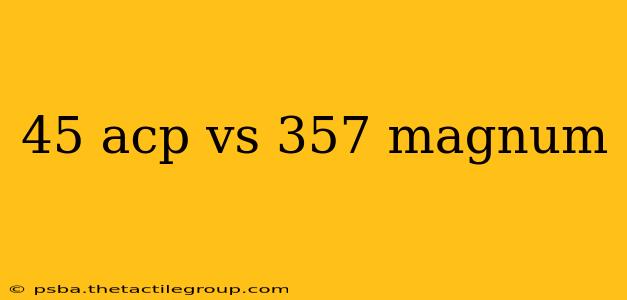Choosing between the .45 ACP and .357 Magnum cartridges is a common dilemma for firearm enthusiasts, self-defense advocates, and hunters alike. Both are powerful rounds with a long history, but their strengths and weaknesses differ significantly. This in-depth comparison will help you understand the nuances of each cartridge, enabling you to make an informed decision based on your specific needs.
Caliber, Stopping Power, and Ballistics
The core difference lies in their design and resulting ballistics. The .45 ACP (Automatic Colt Pistol) is a larger-diameter, relatively slower-moving round, while the .357 Magnum is a smaller, faster cartridge. This translates to distinct performance characteristics:
.45 ACP:
- Caliber: .45 inches (11.43 mm)
- Stopping Power: Known for its substantial stopping power due to its large diameter and heavy bullet weight. The large diameter creates a larger wound cavity, potentially leading to more immediate incapacitation.
- Ballistics: Lower velocity compared to .357 Magnum, resulting in a flatter trajectory at shorter ranges. Recoil is generally considered manageable.
- Penetration: Penetration can be variable depending on the bullet type; some rounds are designed for maximum expansion within the target, sacrificing penetration. Others prioritize deep penetration.
.357 Magnum:
- Caliber: .357 inches (9.07 mm)
- Stopping Power: Offers excellent stopping power due to its high velocity and ability to penetrate deeply. The high velocity creates significant energy transfer.
- Ballistics: High velocity leads to a flatter trajectory at longer ranges. Recoil is noticeably sharper than .45 ACP.
- Penetration: Generally offers greater penetration than .45 ACP, making it effective against thicker barriers or multiple targets.
Recoil and Controllability
Recoil is a critical factor in choosing a cartridge. The .357 Magnum's higher velocity translates to significantly more recoil than the .45 ACP. This can make follow-up shots more challenging, especially for less experienced shooters. The .45 ACP's gentler recoil allows for faster target reacquisition and more accurate follow-up shots. However, the perceived recoil can also vary based on the firearm's weight and design. A heavier .357 Magnum revolver will have less felt recoil than a lightweight one.
Applications: Self-Defense vs. Hunting
The ideal cartridge depends heavily on its intended use.
Self-Defense:
- .45 ACP: Excellent choice for close-quarters self-defense. Its stopping power and manageable recoil make it effective in stressful situations.
- .357 Magnum: Also effective for self-defense, but the sharper recoil can be a disadvantage in high-pressure scenarios. Its higher penetration can be beneficial in situations where barriers need to be penetrated.
Hunting:
- .45 ACP: Suitable for small game hunting at close ranges. Its stopping power is sufficient for animals like rabbits and squirrels. It's generally not recommended for larger game.
- .357 Magnum: More versatile for hunting, suitable for medium-sized game like deer (with appropriate bullet selection and shot placement) at moderate ranges. It offers the penetration and stopping power required for hunting larger prey.
Ammunition Availability and Cost
Both .45 ACP and .357 Magnum ammunition are widely available, but the cost can vary depending on the manufacturer, bullet type, and current market conditions. Generally, .45 ACP tends to be slightly less expensive than .357 Magnum ammunition.
Conclusion: The Best Choice Depends on Your Needs
Ultimately, the "better" cartridge depends entirely on your individual requirements and preferences. The .45 ACP excels in close-quarters situations where stopping power and manageable recoil are paramount. The .357 Magnum, with its higher velocity and penetration, offers greater versatility for self-defense and hunting, although the increased recoil must be considered. Careful consideration of these factors—ballistics, recoil, intended use, and personal comfort—will help you choose the right cartridge for your needs. Remember to always practice safe firearm handling and consult with experienced shooters or professionals before making a decision.

